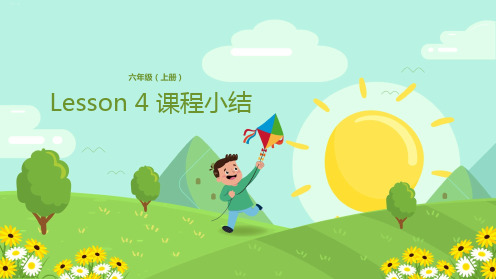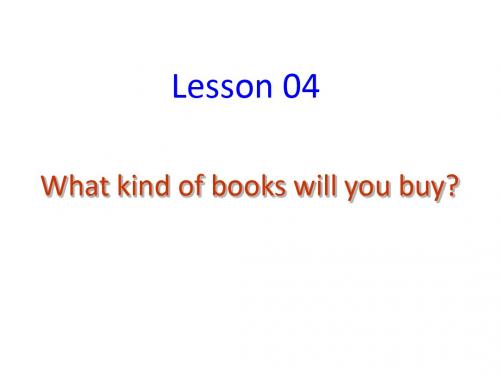科普版英语小学六年级上unit4课件
合集下载
六年级上册英语-Lesson 4 课程小结 科普版ppt课件8

And trees are never mean.
Please let them stay.
So just don't fray.
Keep them clean.
Don't let them lean.
Let them thrive.
And they'll keep you alive.
六年级上册英语-Lesson 4 课程小结 科普版ppt课件8
六年级上册英语-Lesson 4 课程小结 科普版ppt课件8
六年级(上册)
Lesson 4 课程小结
六年级上册英语-Lesson 4 课程小结 科普版ppt课件8
六年级上册英语-Lesson 4 课程小结 科普版ppt课件8
单词
Lesson 4 difficult [ˈdɪfɪkəlt] healthy [ˈhelθɪ] bookshop [ˈbʊkʃɒp] hill [hɪl] air [eə] wet [wet] more [mɔː] country [ˈkʌntrɪ] cut down
7. 任何情况下,细胞衰老都不等于个体衰老。
六年级上册英语-Lesson 4 课程小结 科普版ppt课件8
六年级上册英语-Lesson 4 课程小结 科普版ppt课件8
句型
Enjoy a poem!
Trees
Trees, they' re there every day.
And under them, you can play.
Their leaves can be green.
六年级上册英语-Lesson 4 课程小结 科普版ppt课件8
六年级上册英语-Lesson 4 课程小结 科普版ppt课件8
科普版小学英语六年级上册全册课件(附教案)

▼ 你叔叔明天要来北京吗? ▲ 是的。
Practices
T&F&C
* My aunt is going to come to Beijing tomorrow.
* I’m going to not have a party this evening.
* —Would you like help me? —No, I’d not like to.
Let’s learn
have dinner fly a kite tell a story
study English ride a bike make a plane
Let’s make
Dear Wang Fei, I’m going to have a birthday party at my house this Sunday. Please come to the party at 6:00 pm.
T: Sure, I’d love to. Are you going to ask Eve to come? 当然,我愿意去。你打算邀请伊芙来吗?
L: Certainly. 当然。
Let’s talk
一般将来时态(一般疑问句及回答)
♠ —Are you going to have a birthday party?
home next Sunday evening. Would you like to come? T: Sure, I’d love to. Are you going to ask Eve to come? L: Certainly.
Practices 1. Our summer holiday is _C___.
Lesson 1 Are you going to have a birthday party?
六年级上册英语课件-Lesson4 What kind of books (共20张PPT)_科普版(三起)

Test:(write sentences after the model)
1. ( I play footu do tomorrow?
-I will play football.
-Will you play football ?
-Yes,I will.
Homework:
Do the exercise book P30
See you next time
主语+be going to +动词原形
I am going to visit Ann. They are going to draw a dog. She is going to ride a horse
否定句: 在will后加not,缩写为won’t
I will not go to the library. They will not clean the home. She will not eat lunch at home.
B: -What are they going to do next week? -They are going to fly a kite. -Are they going to fly a kite? -Yes,they are.
4. (She wash some clothes this Saturday)
B: -What is he going to do this evening? -He is going to see a film. -Is he going to see a film? -Yes,he is.
3. (They fly a kite next week)
A: -What will they do next week? -They will fly a kite. -Will they fly a kite? -Yes,they will.
科普版英语六年级上册Lesson 4《What kind of books will you buy》ppt课件1

—What will you do when you grow up? —I will be a farmer. I will work in Heilongjiang(黑龙江).
—What will you do when you grow up? —I will be a driver. I will work in Shenzhen(深圳).
Look and say
—What will Tom do this Sunday? —He will play basketball. —What will Bob do this Sunday? —He will play basketball. —What will Dongdong do this Sunday? —He will play football. —What will Taotao do this Sunday? —He will play football. —What will Eve do this Sunday? —She will fly a kite. —What will Lulu do this Sunday? —She will have a picnic.
New words:
Let’s talk
Let’s learn
-What will you do tomorrow? - I will go to the bookshop. - Will you buy any books? - Yes, I will.
-What will you do tomorrow? - I will go to the cinema. - Will you see a film? - Yes, I will.
—What will you do when you grow up? —I will be a driver. I will work in Shenzhen(深圳).
Look and say
—What will Tom do this Sunday? —He will play basketball. —What will Bob do this Sunday? —He will play basketball. —What will Dongdong do this Sunday? —He will play football. —What will Taotao do this Sunday? —He will play football. —What will Eve do this Sunday? —She will fly a kite. —What will Lulu do this Sunday? —She will have a picnic.
New words:
Let’s talk
Let’s learn
-What will you do tomorrow? - I will go to the bookshop. - Will you buy any books? - Yes, I will.
-What will you do tomorrow? - I will go to the cinema. - Will you see a film? - Yes, I will.
- 1、下载文档前请自行甄别文档内容的完整性,平台不提供额外的编辑、内容补充、找答案等附加服务。
- 2、"仅部分预览"的文档,不可在线预览部分如存在完整性等问题,可反馈申请退款(可完整预览的文档不适用该条件!)。
- 3、如文档侵犯您的权益,请联系客服反馈,我们会尽快为您处理(人工客服工作时间:9:00-18:30)。
• Yaoming doesn’t usually play basketball at seven. • 我是六点起床。 • I get up at six. • Do you get up at six? • I don’t get up at six. • 我七点五十到达学校。 • I get to school at seven fifty. • Do you get to school at seven fifty? • I don’t get to school at seven fifty.
• • • • • • • • • • • •
3. I usually get to school at seven fifty. I usually get to school when/what time. Do you usually get to school when/what time? When/What time do you usually get to school ? 4. I usually do homework at eight. I usually do homework when/what time. Do you usually do homework when/what time? When/What time do you usually do homework ? 5. I usually go to bed at nine thirty. I usually go to bed when/what time. Do you usually go to bed when/what time? When/What time do you usually go to bed ?
“Let’s learn”
• • • • • get up go to school get to school do homework go to bed 起床 去上学 到达学校 做家庭作业 上床睡觉 6:00 7:30 7:50 8:00 9:30
对划线部分提问
• • • • • • • • 1. I usually get up at six o’clock. I usually get up when/what time. Do you usually get up when/what time? When/What time do you usually get up? 2. I usually go to school at seven thirty. I usually go to school when/what time. Do you usually go to school when/what time? When/What time do you usually • • • • • • • • • • • Lulu: Hello, Tom. Tom: Hello, Lulu. Lulu : You are very early Tom: You are very early, too. When do you usually get up? Lulu: I usually get up at seven. Do you get up early every day? Tom: No, I only get up early on weekdays. But Lingling gets /gets/up early every day. Lulu: What time does she get up? Tom: She always gets up before six.
掌握本课词汇短语
学习提问时间特殊疑问句
特殊疑问句
词 汇
• • • • • • • • • weekday /’wi:kdei/ 工作日 weekend /,wi:k'end/ 周末 year /jə:/ 年 factory /'fæktəri/ 工厂 for a moment /'məumənt/ 一会儿 by /bai/ 依据,用,在….旁边 time difference /'difərəns/ 时差 when /wen/ 什么时候 only /‘əunli/ 只有,仅
写出肯定句并变疑问、否定句 • 他通常六点起床。 • He usually gets up at six. • Does he usually get up at six? • He doesn’t get up at six. • 他通常七点半去上学。 • He usually goes to school at seven thirty. • Does he usually go to school at seven thirty? • He doesn’t go to school at seven thirty. • 他通常八点做家庭作业。
重点单词讲解:
• • • • • • • • 1. weekday 工作日:周一到周五。 在工作日 on weekdays 2. weekend 周末 :周六,周日。 在周末 at weekends Early早的,早到的 形容词 反义词 late [leit] 迟到的,晚的 我早到了。 我迟到了。 I am early. I am late.
• • • • • • • • • •
He usually does homework at eight. Does he usually do homework at eight? He doesn’t do homework at eight. 他通常九点半上床休息。 He usually goes to bed at nine thirty. Does he usually go to bed at nine thirty? He doesn’t go to bed at nine thirty. 姚明通常七点打篮球。 Yaoming usually plays basketball at seven. Does Yaoming usually play basketball at seven?
